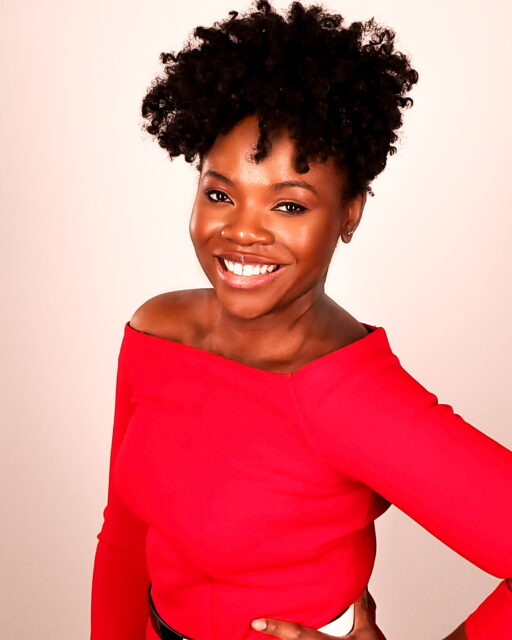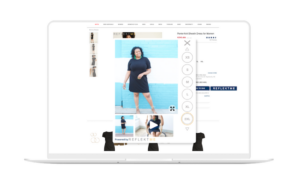In the vast realm of e-commerce, it’s time to think beyond providing the best shade of nail polish. Showing a wider range of skin tones, sizes, ages and physical abilities is part of connecting people and humanizing those who have traditionally been “othered” in a thin, white-centric media landscape.
Thankfully, someone is working on this very issue, and when her vision is fully realized, consumers will be able to see more accurate versions of themselves in those jeans, with that nail polish or on that easy chair.

Tope Mitchell cofounded Reflekt Me, an e-commerce, hyper-personalization platform designed to work seamlessly within existing shopping platforms so that those with a wider variety of body types and skin tones can see themselves represented accurately in the retail products. For businesses, this means reaching a broader, more diverse customer base and handling fewer returns. The National Retail Federation estimates that shoppers returned $428 billion in merchandise in 2020—much of which went straight into landfills.
The idea for Reflekt Me was inspired by Mitchell’s young daughter, Sophia, who loved looking at her reflection in the mirror. “This little Black girl loves herself,” Mitchell says. “I have a timetable—I need to fix this issue before she notices that the world wants to break her down.”
There’s also Mitchell’s son, Gerald, who is 2. “I need people to humanize us more,” Mitchell says. “I have a daily reminder of why I need to do this. I have such an unquenchable need to make society better, but I’m a mom, too.”
Excluding groups of people is called “symbolic annihilation,” she says. “We’ve made leaps and bounds, but our system still has a lot of sexism and racism and classism in it. And so whether it’s shopping online or in movies, where you’re only seeing people negatively, then that allows people in power to say, ‘Those people aren’t humans.'”
Mitchell hopes that more everyday and positive depictions of marginalized people will be part of what chips away at pervasive, systemic racism and sexism.
This mission isn’t new for Mitchell. She’s continually worked to help others, starting from earning her Masters’ and Ph. D. in sociology from Indiana University. At first, she figured that she’d start on the same path as Dr. Martin Luther King, Jr. “I didn’t think about being like MLK in terms of a job, actually, but a purpose. I was a teenager, so it was more so this feeling that if he learned how to change America by studying something then that’s what I wanted to study.”
While pursuing a solely academic career was intriguing, she thought she could have a more immediate impact working directly with those who need the most help. “I felt disconnected when I was focusing on publishing,” she says, adding that she started to love studying multicultural insights into corporate America in order to figure out ways to make it more equitable.
As Mitchell learned more about business and transitioned to work in corporate America, she began to see that major companies didn’t always know about their customers—or who they could be. “They were really behind the times in terms of understanding America,” she says, noting that most women in America are size 16-18, and that one brand’s medium is another’s large. There are so many markets yet to be tapped.
I have a daily reminder of why I need to do this. I have such an unquenchable need to make society better.
—Tope Mitchell, cofounder, Reflekt Me
Making it real
Mitchell and her husband, Gerald, Reflekt Me’s chief operating officer and product manager, created a plan, starting with a simple enough concept: What if everyone could see what they would look like in any online retail offering? Some brands actually do this by using various-sized people modeling the same item or by using a carousel-type display in which online shoppers can spin a digital wheel and see women of every size in their jeans. But that can be expensive and time-consuming to create.
Reflekt Me relies on an ambassador program using employees, micro- or nano-influencers, and real customers who can take a good photo of the products for sale—depending on the needs and budget of the brand using the interface.

Here’s how it works: Brands sign up to use the tool with a quarterly fee, but once Reflekt Me integrates with the Shopify and Shopify Plus platforms, it will be a monthly subscription. Reflekt Me uses photos from a network of real people sourced by the brands to display authentic product imagery—pictures of people of various sizes and skin tones modeling the goods. The network of ambassadors are mostly “real people who can take good photos,” Mitchell says, adding that some are influencers, actors and musicians.
Then the brand collects and curates that content by providing a link for their ambassadors, who have either purchased the products or been given them. Those photos are uploaded to the Reflekt Me tool, and once they’re approved on the brand’s end, they can be immediately viewed on the website. When online shoppers click the “Reflekt Me” button, they can choose their size and see the corresponding uploaded photos.
Representation—and money—matters

To be sure, some brands are paying attention to representation—think Sephora and Universal Standard (which has completely revamped its sizing conventions to more accurately portray American averages). But Reflekt Me is a game-changer in that even small companies without the budget or bandwidth to hire multiple models can play to a diverse consumer base. There are programs that “scrape” the internet for images, but there’s a lot of room for error there. Reflekt Me’s superpower is a dashboard in which the influencer or customer can click a link and upload a picture of themselves modeling the product, which goes directly to the product page after client approval and curation. “It’s just a click of a button; it’s just as easy as Instagram or anything else,” Mitchell says.
After receiving their first round of pre-seed funding of $25,000 in 2020 from Backstage Capital, which specializes in supporting underrepresented founders, the Mitchells invested their own money and raised funds from friends and family. They then entered an accelerator program via Creative Destruction Lab and built their team. Tope was also accepted into the 2021 New York Fashion Tech Lab (NYFL) cohort. The program fosters collaboration, partnership, and business development among women-led companies and funders, retailers and other experts.
Jackie Trebilcock is the managing director at NYFL. “[Tope] has such a great attitude about everything, and I think what she’s building is interesting—and so did the industry—which is why she was selected,” she says. “She was great to have in the program and was wonderful to work with. I’m a big fan of hers and glad to have her in our network.”
For Mitchell’s proof of concept in the fall of 2020, she enlisted a small online T-shirt shop and hired the company’s customers to be ambassador models of different sizes so that shoppers could see someone like themselves in the shirts. Sales increased—as did customer engagement. That helped open doors to bigger brands, and recently, the company landed a major retail apparel client.
The future of Reflekt Me
Right now, the most obvious incarnation of the Reflekt Me technology is for clothing and makeup, but it could also be for houseware—what about sitting your virtual self down on a couch you’re considering or seeing what it might be like to stand in front of kitchen curtains? It goes a little beyond the augmented reality that’s beginning to show up in the shopping experience. “If I can actually see someone who is my height on it, that makes me way more informed to go ahead and make that purchase online,” Mitchell says. “It’s just so, so important for us to have that information because that’s why there are trillions in cart abandonment. That’s why there are hundreds of billions in returns.”
Perhaps one day there will also be a way to do a virtual try-on with your own photo, but surprisingly, Mitchell says, that may work against retailers—we tend not to like our own photos and actively look for every imperfection. “But I can see someone who is like my exact size and go, Well, she looks good. I look good. We’re more empathetic toward other people than we are toward ourselves.”
Lead photo courtesy of Shutterstock

